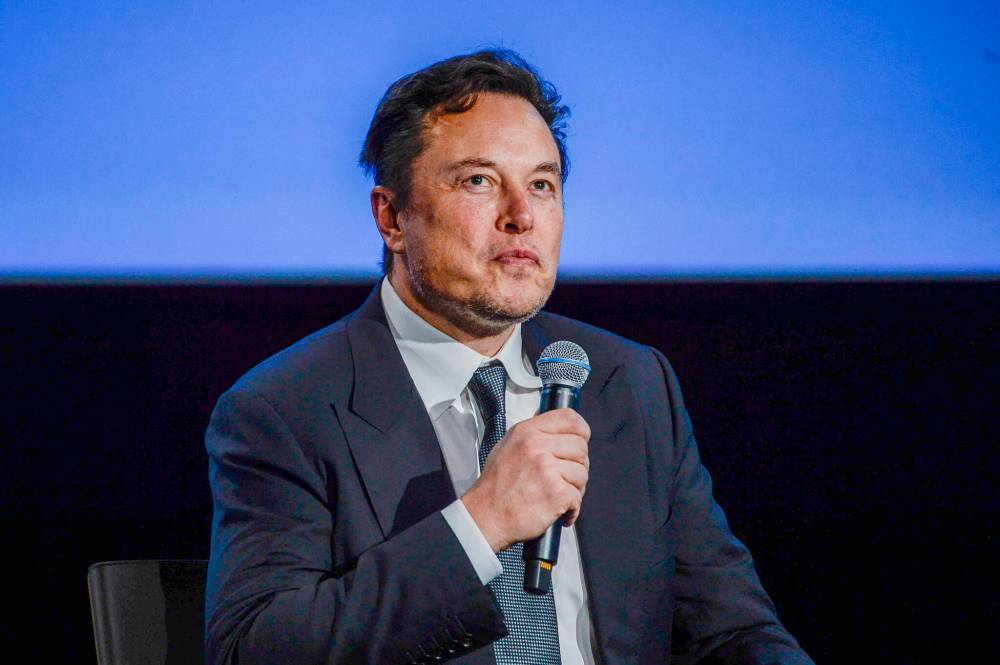Musk derives fame, not fortune, from Twitter
Advertisement
Read this article for free:
or
Already have an account? Log in here »
To continue reading, please subscribe:
Monthly Digital Subscription
$0 for the first 4 weeks*
- Enjoy unlimited reading on winnipegfreepress.com
- Read the E-Edition, our digital replica newspaper
- Access News Break, our award-winning app
- Play interactive puzzles
*No charge for 4 weeks then price increases to the regular rate of $19.00 plus GST every four weeks. Offer available to new and qualified returning subscribers only. Cancel any time.
Monthly Digital Subscription
$4.75/week*
- Enjoy unlimited reading on winnipegfreepress.com
- Read the E-Edition, our digital replica newspaper
- Access News Break, our award-winning app
- Play interactive puzzles
*Billed as $19 plus GST every four weeks. Cancel any time.
To continue reading, please subscribe:
Add Free Press access to your Brandon Sun subscription for only an additional
$1 for the first 4 weeks*
*Your next subscription payment will increase by $1.00 and you will be charged $16.99 plus GST for four weeks. After four weeks, your payment will increase to $23.99 plus GST every four weeks.
Read unlimited articles for free today:
or
Already have an account? Log in here »
Hey there, time traveller!
This article was published 27/12/2022 (1077 days ago), so information in it may no longer be current.
A squeaky plaything for the family dog will keep it entertained at a cost of only a few dollars, not including the annoying loss of peace for its owner.
On the other hand, it cost US$44 billion for billionaire entrepreneur Elon Musk to purchase his new toy, Twitter, in October; not included in the price are the growing number of annoyances the social-media platform’s users have had to put up with from its owner.
Mr. Musk has worked feverishly to keep his name in the headlines since dubbing himself “Chief Twit” after his months-long transaction for Twitter was finalized. Such notoriety has often been at the expense of Twitter and his other businesses.

CARINA JOHANSEN / THE ASSOCIATED PRESS FILES
Elon Musk bought Twitter for US$44 billion.
He has become one of the world’s most recognizable people and, many would argue, one of its most loathed.
His latest attempt to jerk the collective chain of Twitter users, and the world in general, took place Dec. 18, when he posted a poll asking users to decide whether he should remain as the platform’s chief executive officer. He promised he would respect the results of the online vote, even if they were not in his favour.
Skeptical members of the Twitter community thought it was a trick to expose Mr. Musk’s detractors and ban them from the platform.
Still, more than 17.5 million users took Mr. Musk up on this somewhat dubious online vote of confidence, and 57.5 per cent of them — more than 10 million users — said he should hand Twitter’s reins to someone else.
Mr. Musk had heeded the Twitter majority’s wishes before, most notably when he reinstated Donald Trump’s account, which the former U.S. president had used to spread disinformation about COVID-19, the integrity of the 2020 presidential election — which he lost — and to incite the violent attack on the U.S. Capitol on Jan. 6, 2021.
But when it came to keeping the top job he paid so dearly for, Mr. Musk took a page from Mr. Trump’s playbook and questioned the veracity of the poll’s results. Fake news, as it were.
While the former president is just that — former — Mr. Musk remains Twitter’s CEO.
He tweeted the day after the results were announced that he would change how Twitter polls work, allowing votes only from those who have paid subscriptions to its fledgling “Twitter Blue” service.
Mr. Musk’s other cutting-edge businesses, such as Tesla, the electric-car manufacturer, and Space-X, which builds and launches rockets and satellites, deliver handsome profits, but they don’t afford him the celebrity he so obviously craves. Twitter does that, but it also loses so much money that its new owner continued to fire staff in the days leading up to Christmas.
On the day of his much-ballyhooed poll, Mr. Musk was photographed in a luxury box in a stadium in Doha, Qatar, during the final of the World Cup, hobnobbing with Qatari and Saudi princes, many of whom helped finance his Twitter acquisition.
Twitter has never become the internet utopia many dreamed it could be when it launched in March 2006. Instead, it has become a virtual home for promoters, scammers, profiteers, harassers and extremists. They and Twitter’s new owner, Mr. Musk, have wrung out most of the amusement and information value its users once envisioned and tried to create.
How relevant Twitter remains for its declining number of users will depend largely on whether this new social-media “toy” continues to command the lion’s share of Mr. Musk’s attention, and whether the day-to-day drudgery of cutting costs at a money-losing enterprise eventually eclipses the celebrity value he receives from owning it.

